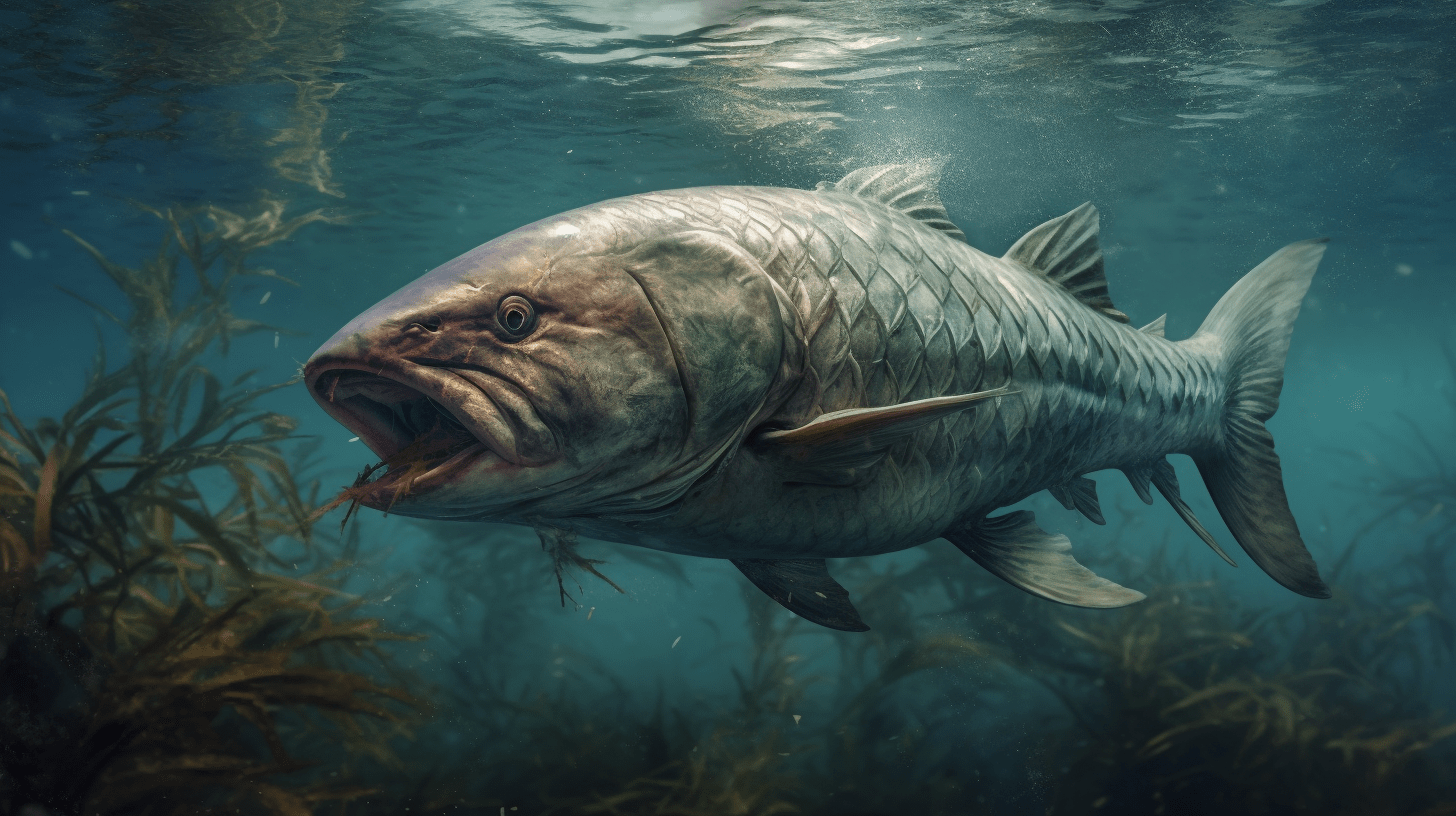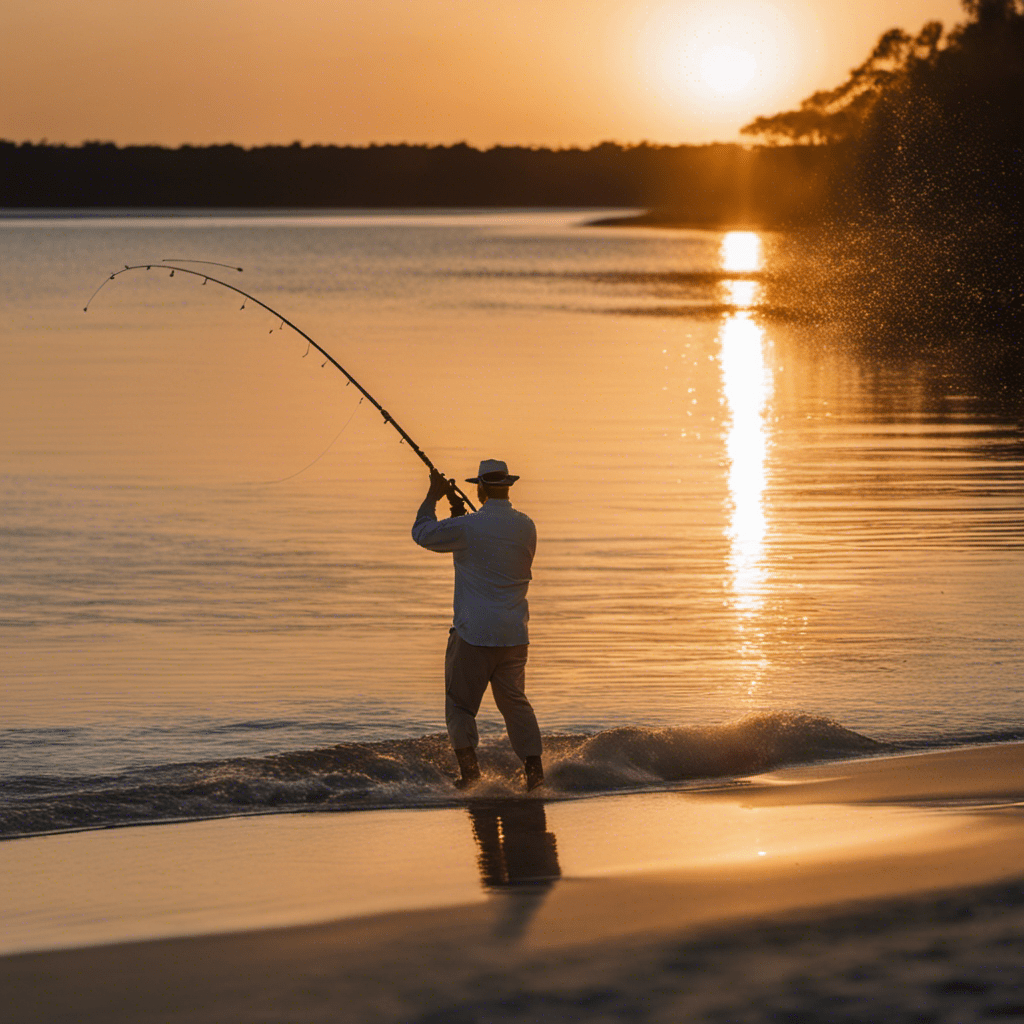Looking to reel in some monster tarpon in South Carolina? Get ready to become a pro with these expert tips.
From the best time of year to fish, to the right gear and prime hotspots, we’ve got you covered.
Master the essential techniques and learn how to hook and land these impressive fighters in South Carolina’s waters.
So grab your gear, hit the coastline, and get ready for the ultimate tarpon fishing experience.
- Best Time of Year for Tarpon Fishing in South Carolina
- Choosing the Right Fishing Gear for Tarpon in South Carolina
- Locating Prime Tarpon Hotspots Along the South Carolina Coastline
- Mastering Essential Tarpon Fishing Techniques in South Carolina
- Tips for Hooking and Landing Tarpon in South Carolina's Waters
- Frequently Asked Questions
Best Time of Year for Tarpon Fishing in South Carolina
You should try tarpon fishing in South Carolina during the summer months for the best chances of success. This is because South Carolina is a prime location for the tarpon migration patterns during this time. Tarpon migrate along the Atlantic coast, and South Carolina offers a great opportunity to catch these impressive fish. The warm waters and abundance of baitfish attract tarpon to the area.
Speaking of bait, the best bait for tarpon in South Carolina is live mullet or pogies. These baitfish are irresistible to tarpon and will increase your chances of a successful catch. So, plan your fishing trip during the summer months, stock up on live mullet or pogies, and get ready for an exciting tarpon fishing adventure in South Carolina.
Now, let’s move on to choosing the right fishing gear for tarpon in South Carolina.
Choosing the Right Fishing Gear for Tarpon in South Carolina
When fishing for tarpon in South Carolina, it’s important to select the right fishing gear and use it effectively to increase your chances of a successful catch. Selecting appropriate fishing tackle is crucial for tarpon fishing in South Carolina. The right rod and reel combo can make all the difference in landing a trophy tarpon. Here are some expert tips for selecting the best gear and rigging baits and lures for tarpon in South Carolina:
| Category | Gear |
|---|---|
| Rod and Reel Combo | Heavy action rod with a high-capacity reel |
| Line | 30-50 lb test braided line |
| Hooks | 4/0-6/0 circle hooks |
| Bait/Lures | Live mullet, crabs, or soft plastic swimbaits |
When rigging baits, make sure to use a strong leader to handle the tarpon’s powerful runs. Attach the hook to the leader using a loop knot for maximum movement. For lures, choose ones that mimic the tarpon’s natural prey and have a realistic swimming action. By selecting the right fishing gear and rigging baits and lures effectively, you’ll be well-equipped to tackle the challenging tarpon in South Carolina’s waters.
Locating Prime Tarpon Hotspots Along the South Carolina Coastline
To increase your chances of catching tarpon along the South Carolina coastline, it’s crucial to know where the prime hotspots are and how to find them. Understanding tarpon migration patterns and feeding habits is key to locating these hotspots.
Tarpon are known to migrate along the South Carolina coast during the summer months, seeking warmer waters and abundant food sources. Look for areas where there’s a combination of deep channels, flats, and structure such as reefs or wrecks. These areas provide tarpon with shelter and access to their preferred prey, such as mullet and crabs. Pay attention to tides and currents, as tarpon often gather in areas with strong water flow.
Now that you know where to find the hotspots, let’s dive into mastering essential tarpon fishing techniques in South Carolina.
Mastering Essential Tarpon Fishing Techniques in South Carolina
If you frequently practice casting and reeling techniques, you’ll improve your chances of mastering essential tarpon fishing techniques in South Carolina.
One important aspect to consider is the tarpon migration patterns. Tarpon are known to migrate along the South Carolina coastline during certain seasons, so understanding their movement patterns can greatly enhance your chances of a successful catch.
Additionally, reading tides for tarpon fishing is crucial. Tarpon tend to be more active during certain tidal phases, such as incoming tides or high tides. By studying tide charts and understanding how the tides affect tarpon behavior, you can strategically plan your fishing trips for optimal results.
It’s also important to remember that tarpon are highly sensitive to noise and vibrations, so practicing stealthy approaches and using quiet fishing gear can significantly increase your chances of a successful catch.
Keep these tips in mind as you work towards mastering tarpon fishing techniques in South Carolina.
Tips for Hooking and Landing Tarpon in South Carolina’s Waters
You can increase your chances of hooking and landing tarpon in South Carolina’s waters by using live bait and maintaining constant tension on the line. Tarpon are known for their strong fighting ability and acrobatic jumps, so it’s important to be prepared and follow these expert tips:
-
Understand tarpon migration patterns: Tarpon migrate along the coast of South Carolina during the summer months, so it’s crucial to know where they’re most likely to be found. Research their preferred habitats and feeding grounds to increase your chances of success.
-
Choose the right live bait: Tarpon are notorious for being picky eaters. Opt for live bait such as mullet, crabs, or shrimp, as these are their preferred meals. Make sure to present the bait in a natural and enticing manner.
-
Handle and release tarpon safely: Tarpon are a prized gamefish and should be treated with care. Use proper handling techniques to minimize stress and injury to the fish. Avoid lifting them by their jaws and support their weight properly. When releasing, ensure they’re fully revived before letting them swim away.
-
Maintain constant tension on the line: Tarpon are known for their powerful runs and jumps, so it’s crucial to keep a constant pressure on the line. This will prevent them from throwing the hook and increase your chances of successfully landing them.
Frequently Asked Questions
What Are the Fishing Regulations and Permits Required for Tarpon Fishing in South Carolina?
To fish for tarpon in South Carolina, you’ll need to abide by fishing regulations and obtain the necessary permits. The best time for tarpon fishing in South Carolina is during the warmer months.
Are There Any Specific Weather Conditions That Are Ideal for Tarpon Fishing in South Carolina?
To catch tarpon in South Carolina, you’ll need to consider the ideal weather conditions. Look for warm water temperatures, calm winds, and clear skies. The best locations are near inlets, channels, and jetties.
What Are the Common Mistakes or Pitfalls to Avoid When Fishing for Tarpon in South Carolina?
To succeed in tarpon fishing in South Carolina, avoid common mistakes like using the wrong bait or failing to adjust your techniques. Follow expert tips for a successful fishing experience.
Are There Any Specific Bait or Lure Recommendations for Tarpon Fishing in South Carolina?
To catch tarpon in South Carolina, use effective bait or lures. The best fishing spots for tarpon in South Carolina offer various options. Follow these tips for landing big tarpon in the state’s waters.
Are There Any Local Fishing Charters or Guides That Specialize in Tarpon Fishing in South Carolina?
Looking for the best spots to catch tarpon in South Carolina? Local fishing charters and guides specialize in tarpon fishing, offering expert knowledge and experience. They know the hotspots and can help you reel in the big ones.

